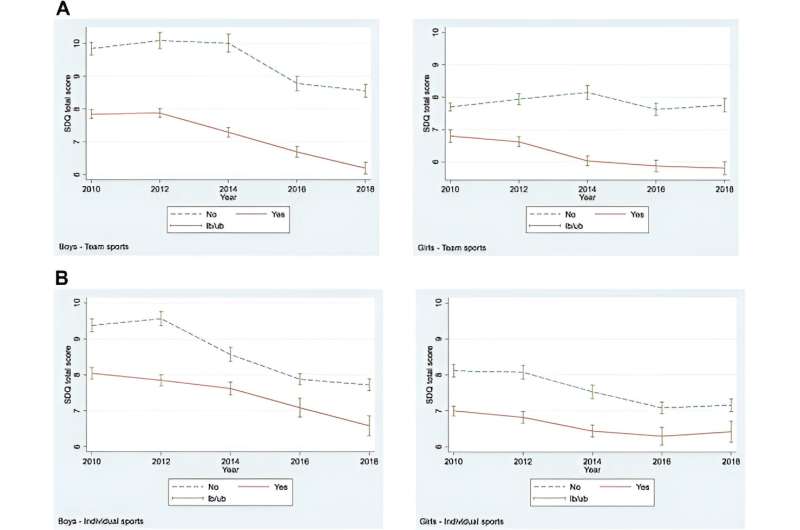This article has been reviewed according to Science X's editorial process and policies. Editors have highlighted the following attributes while ensuring the content's credibility:
fact-checked
peer-reviewed publication
trusted source
proofread
Research finds association between sports participation and psychosocial well-being of Australian children

A study led by University of Queensland researchers has found children who regularly participate in sports from an early age will have better long term mental health. The research is published in the Journal of Adolescent Health.
Associate Professor Asad Khan from UQ's School of Health and Rehabilitation Sciences led the study, which analyzed the data of more than 4,200 Australian children over an eight-year period from the Longitudinal Study of Australian Children.
"Consistent participation in sports from childhood is associated with better mental well-being among adolescents," Dr. Khan said.
"Our research looked at the benefits of team sports such as football, cricket, or netball, and individual sports like karate, tennis, or gymnastics.
"We found there was a positive impact on mental health regardless of the type of sport, however children who played in a team experienced greater benefit.
"This could be due to the social aspects involved such as being surrounded by supportive peers, opportunities to form friendships, and working towards a collaborative goal."
According to the Australian Institute of Health and Welfare, around 14% of children aged between four and 11 experience a mental disorder in Australia, with boys commonly more affected than girls.
The research found children who internalize their emotions and have difficulties socializing with their peers greatly benefit from playing sport in a team setting.
Dr. Khan said while the results showed positive outcomes for both boys and girls, more needs to be done to encourage girls to get involved in team sport, particularly at a younger ages.
"At ages six and seven, around 59% of boys participated in team sports, compared to only 26% of girls," Dr. Khan said.
"We found that boys who played team sports experienced fewer psychosocial difficulties and better health-related quality-of-life, while the benefits of team sport participation was lower among girls.
"Some possible reasons to explain girls' lower level of team sports involvement could include lack of self-belief and confidence in sporting ability, or the common stereotype of team sports being a male-dominant activity.
"It could also be due to a lack of opportunity for girls to participate in team sports, or a lack of diversity of sports offered in schools and co-curricular programs."
Dr. Khan hopes the research will inform strategies to promote children's sports participation and further investigation into why young girls are less likely to participate in team sports.
More information: Asaduzzaman Khan et al, Association Between Sports Participation and Psychosocial Wellbeing of Australian Children: An 8-year Longitudinal Study, Journal of Adolescent Health (2023). DOI: 10.1016/j.jadohealth.2023.07.011


















